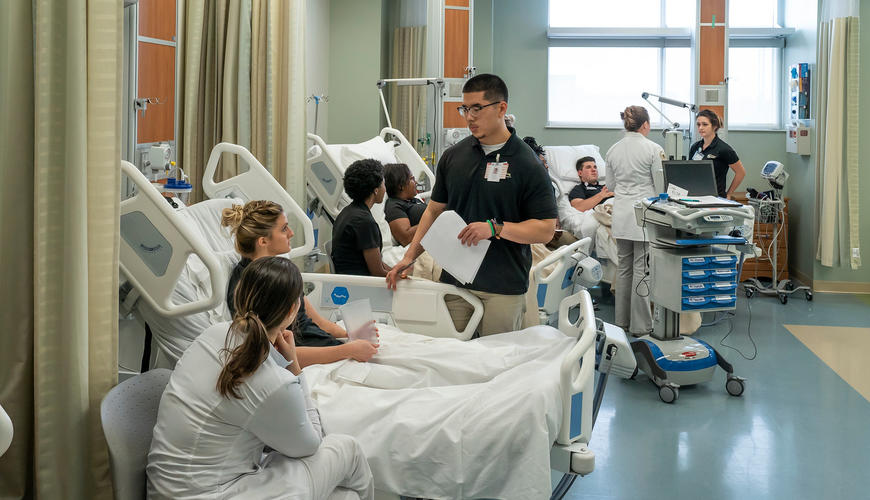




CHS Faculty Development Opportunities
-
TeleMental Health Training Certificate Program Opportunity
Offered as a component of the HRSA OPTIMISE Rural NC project in the Department of Social Work, the Telehealth Certification Institute’s TeleMental Health Training Certificate (THTC) is awarded to dedicated telemental health clinicians who have successfully completed this program. The THTC program provides evidence-based, advanced, and comprehensive training that prepares clinicians to offer behavioral health services while in a different location than the client through the use of technology. This opportunity is open for up to 4 faculty in the UNCP Departments of Social Work, Kinesiology or School of Nursing.
The THTC program is for any behavioral health professional, including but not limited to social workers, marriage and family therapists, psychologists, physicians, nurses, and chaplains. Clinicians who have earned the THTC take special consideration of their clients' privacy as it relates to the use of technology, and the needed effort to ensure that they remain up-to-date on the best practices of providing services remotely.
The THTC Program can be completed as an online self-study, by live online webinars, or with a hybrid approach of part self-study and part live-webinar.
Faculty and site supervisors who complete the THTC program will be asked to provide at least one presentation to OPTIMISE field site organizations and/or MSW/MAEd OPTIMISE students regarding best practices in telemental health. Presentations could be conducted virtually or in-person, with the possibility of presenting at the CHS and SWK conferences this academic year. Faculty trainers will be compensated at $75/training hour to include preparation time via an additional employment contract that will be paid at the end of each fall, spring, and summer semester.
You can view more information about the Telehealth Certification Institute’s TeleMental Health Training Certificate here: https://telementalhealthtraining.com/the-thtc-certificate
Please email Dr. Summer Woodside at summer.woodside@uncp.edu if you are interested in this opportunity.
-
Community Resilience Initiative Training of Trainers Opportunity
Offered as a component of the HRSA OPTIMISE Rural NC project in the Department of Social Work, the Community Resilience Initiative’s (CRI) Trauma-Informed Training for Trainers opportunity is being offered to 5 faculty in the UNCP Departments of Social Work, Kinesiology or School of Nursing.
The Community Resilience Initiative inspires healthier communities with science-based insights in order to promote and cultivate resilience.The CRI’s Trauma-Informed Training for Trainers prepares individuals to conduct CRI’s Trauma-Informed Certification Program, Course 1 in his or her organization. Faculty who complete this certification program will receive training tips to present everything from the N.E.A.R. Sciences, Brain States, and CRI’s signature R.O.L.E.S. Training; a research-based approach to responding to trauma. This acclaimed training for trainers also introduces individuals to ECTcellence, a trauma-informed instructional framework to effectively and efficiently facilitate the learning process.
The key objective of the Course 1 Trauma Informed course is to provide information about identifying and responding to trauma with evidence-based resilience strategies when working with an audience whose trauma history may not be known. After completion of the Course 1 Trauma Informed course, the Course 1 Training of Trainers course can be completed. The Trauma Informed Training of Trainers is a two-day course that prepares individuals to conduct CRI’s Trauma-Informed Certification Program, Course 1 in his/her/their organization or agency. Both courses are provided in an asynchronous, virtual format.
Faculty who complete the training-of-trainers will be asked to provide at least one presentation to OPTIMISE field site organizations and/or MSW/MAEd OPTIMISE students regarding trauma-informed practices. Presentations could be conducted virtually or in-person, with the possibility of presenting at the CHS and SWK conferences this academic year. Faculty trainers will be compensated at $75/training hour to include preparation time via an additional employment contract that will be paid at the end of each fall, spring, and summer semester.
You can view more information about the Community Resilience Initiative here https://criresilient.org/. The CRI Course Catalog can be viewed here: https://criresilient.org/wp-content/uploads/2021/05/Course-Catalog-1-1.pdf
Please email Dr. Summer Woodside at summer.woodside@uncp.edu if you are interested in this opportunity.
-
NC-Violent Death Reporting System Training & Champion Opportunity
Mr. Scott Proescholdbell and his team at the NC Violent Death Reporting System provided a virtual workshop to interested CHS faculty and staff on Thursday, September 30th. You can read more about the NC-VDRS here: https://www.injuryfreenc.ncdhhs.gov/About/ncVDRS.htm. A new NC-VDRS Dashboard was introduced during this training.
Offered as a component of the HRSA OPTIMISE Rural NC project in the Departments of Social Work & Counseling, this training will enable faculty to integrate the NC-VDRS datasets into learning opportunities and collaborative efforts to inform prevention research, policy, and practice in Southeastern Rural NC.
Further, participation will allow for “Faculty Champions'' committed to completing training, accessing the system to conduct research, and providing additional training for other faculty, agency staff, and students to be identified. There are funds to support 2 NC-VDRS faculty champions per year during the four-year funding period.
Contact Dr. Summer Woodside, PI, and Dr. Cindy Locklear, Co-PI, for more information about the Faculty Champion opportunities.
-
Certified Healthcare Simulation Educator (CHSE) Certification Opportunity
Offered as a component of the HRSA OPTIMISE Rural NC project in the Departments of Social Work & Counseling, the Certified Healthcare Simulation Educator (CHSE) certification has been developed as a service to the healthcare simulation community and is intended for individuals who perform healthcare simulation in the educator role. The CHSE will prepare faculty to conduct integrated behavioral health care simulations. This opportunity is open for two faculty in the UNCP Departments of Social Work, Counseling, Kinesiology or School of Nursing.
The Society for Simulation in Healthcare (SSH) developed the certification process for educators focused on healthcare simulation. This program has been developed over a number of years with the input of many individuals representing a wide variety of backgrounds and experience in healthcare simulation. Individuals from the international healthcare simulation community including other simulation societies contributed to the success of CHSE® Certification. The CHSE® certification is intended for individuals who perform healthcare simulation in the educator role without restriction to:
- simulation modality
- setting (locations where simulation takes place)
- geographic location
- learner population
- function (e.g. teaching, assessment)
-
profession
Faculty who complete the CHSE certification will be asked to conduct at least one interprofessional simulation that includes OPTIMISE field site supervisors, MSW/MAEd OPTIMISE students, and CHS students in nursing and/or kinesiology in Spring 2022. Faculty trainers will be compensated to include preparation time via an additional employment contract that will be paid at the end of the spring semester.
You can view more information about the Certified Healthcare Simulation Educator (CHSE) certification here: https://www.ssih.org/Credentialing/Certification/CHSE
Please email Dr. Summer Woodside at summer.woodside@uncp.edu if you are interested in this opportunity.
This program is supported in part by the Health Resources and Services Administration (HRSA) of the U.S. Department of Health and Human Services (HHS) as part of an award totaling $1,913,297 with 0% financed with nongovernmental sources. The contents are those of the author(s) and do not necessarily represent the official views of, nor an endorsement, by HRSA, HHS, or the U.S. Government. For more information, please visit HRSA.gov.
